Notable Submarine Accidents: Difference between revisions
Pbcjohnston (talk | contribs) |
Pbcjohnston (talk | contribs) |
||
| Line 26: | Line 26: | ||
<div style="text-align: justify;"><span style="color:#00008B">F-4 got underway for a completely routine one day training voyage from her base in Honolulu Harbor, HI. on the morning of March 25, 1915. What no one knew at the time was that acid from her lead-acid battery cells had seeped out of the cells and had gathered on the steel plating lining the bottom of the battery well, which was also part of the pressure hull. Accumulated over a period of months, the acid had gradually eaten away at the steel until the fateful day of March 25. While she was submerged during a routine training dive, the increased pressure caused the weakened hull to develop a bad leak that allowed water to enter the battery wells. The wells could not be pumped out because the tar pitch that was used to help seal the well had clogged the drainage piping. This extra weight led to a loss of depth control. | <div style="text-align: justify;"><span style="color:#00008B">F-4 got underway for a completely routine one day training voyage from her base in Honolulu Harbor, HI. on the morning of March 25, 1915. What no one knew at the time was that acid from her lead-acid battery cells had seeped out of the cells and had gathered on the steel plating lining the bottom of the battery well, which was also part of the pressure hull. Accumulated over a period of months, the acid had gradually eaten away at the steel until the fateful day of March 25. While she was submerged during a routine training dive, the increased pressure caused the weakened hull to develop a bad leak that allowed water to enter the battery wells. The wells could not be pumped out because the tar pitch that was used to help seal the well had clogged the drainage piping. This extra weight led to a loss of depth control. | ||
Several months earlier, the boat had been fitted with an experimental propeller design that was intended to provide maximum thrust at low RPM's. When the captain attempted to power out of the descent | Several months earlier, the boat had been fitted with an experimental propeller design that was intended to provide maximum thrust at low RPM's. When the captain attempted to power out of the uncontrolled descent, the increased RPM's caused the propellers to cavitate badly and lose thrust. When the boat passed crush depth the hull catastrophically imploded and F-4 sank with all hands. There were no survivors. | ||
Five and a half months later, after a herculean effort involving unparalleled bravery and incredible ingenuity, F-4 was raised from 306 feet (92.3 m) of water and returned to Honolulu where she was drydocked and inspected. The remains of her crew were removed and given a hero's procession through Honolulu before they were returned to the mainland for burial. After the completion of the accident investigation, F-4 was stripped of any useful equipment and her hulk was towed to Pearl Harbor where it was dropped in the shallow waters of the then unused Magazine Loch. 25 years later it was found that her wreck was in the way of the rapidly expanding Submarine Base so a trench was dug next to the wreck and she was rolled into it. This got her out of the way and allowed the base to continue its expansion. She remains there to this day, just a few yards off berth S13. | Five and a half months later, after a herculean effort involving unparalleled bravery and incredible ingenuity, F-4 was raised from 306 feet (92.3 m) of water and returned to Honolulu where she was drydocked and inspected. The remains of her crew were removed and given a hero's procession through Honolulu before they were returned to the mainland for burial. After the completion of the accident investigation, F-4 was stripped of any useful equipment and her hulk was towed to Pearl Harbor where it was dropped in the shallow waters of the then unused Magazine Loch. 25 years later it was found that her wreck was in the way of the rapidly expanding Submarine Base so a trench was dug next to the wreck and she was rolled into it. This got her out of the way and allowed the base to continue its expansion. She remains there to this day, just a few yards off berth S13. | ||
Revision as of 20:56, 29 December 2023
Notes
This section is meant to highlight some of the notable accidents that befell our Submarine Force during the pigboats era. The purpose is to honor the bravery and sacrifice of the men involved, and to show that the Navy persevered and learned from its mistakes. The technology matured and submarines got safer, but sailing a ship under the sea will never be a safe activity. This list is not all-inclusive, nor will it tell the full tale of each incident. It will give an overview and highlight some of the photographs that Ric has collected over the years. Many of these incidents have been covered in depth by other authors, and when possible we will provide links to books that we know will tell the full tale.
For further information on the men who gave their lives in these incidents, we highly recommend the website On Eternal Patrol, or OEP. Charles Hinman and his team have done an amazing job of gathering information on our deceased shipmates. Please take a look.Grampus (Submarine No. 4) and Pike (Submarine No. 6) gasoline fire, September 19, 1908
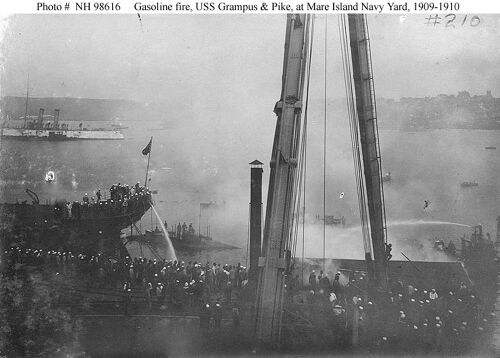
For a contemporary newspaper article that goes into depth on this incident, please see this link. Note: please disregard the clerical date error at the top of the NHHC photograph. The fire did happen in 1908.
F-4 (Submarine No. 23), Hull failure during a test dive, March 25, 1915
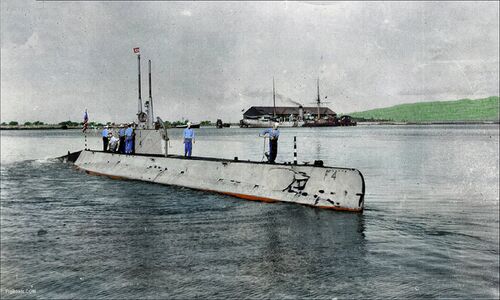
Several months earlier, the boat had been fitted with an experimental propeller design that was intended to provide maximum thrust at low RPM's. When the captain attempted to power out of the uncontrolled descent, the increased RPM's caused the propellers to cavitate badly and lose thrust. When the boat passed crush depth the hull catastrophically imploded and F-4 sank with all hands. There were no survivors.
Five and a half months later, after a herculean effort involving unparalleled bravery and incredible ingenuity, F-4 was raised from 306 feet (92.3 m) of water and returned to Honolulu where she was drydocked and inspected. The remains of her crew were removed and given a hero's procession through Honolulu before they were returned to the mainland for burial. After the completion of the accident investigation, F-4 was stripped of any useful equipment and her hulk was towed to Pearl Harbor where it was dropped in the shallow waters of the then unused Magazine Loch. 25 years later it was found that her wreck was in the way of the rapidly expanding Submarine Base so a trench was dug next to the wreck and she was rolled into it. This got her out of the way and allowed the base to continue its expansion. She remains there to this day, just a few yards off berth S13.
PigBoats.COM is proud to display a collection of photographs of her salvage and those are presented here. In addition, the webmasters provided author Jon Humboldt Gates with technical advice for his book Before the Dolphins Guild which tells the story of the loss of the F-4.A-7 (Submarine No. 8), Gasoline explosion and fire, July 24, 1917
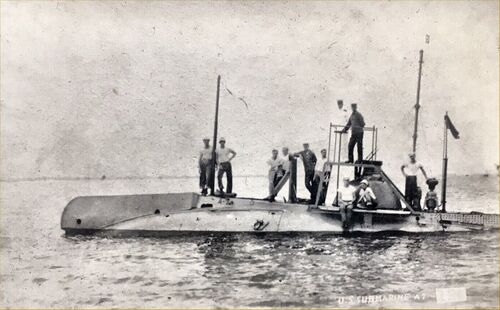
F-1 (Submarine No. 20), Collision with F-3 (Submarine No. 22), December 17, 1917
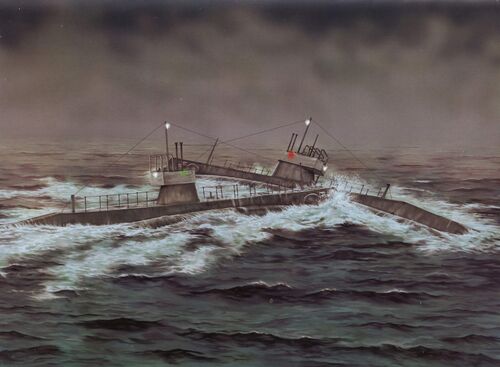
O-5 (SS-66), Battery explosion, October 5, 1918
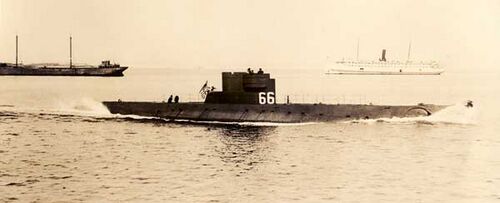
S-6 (SS-111), Collision with a destroyer, 1922
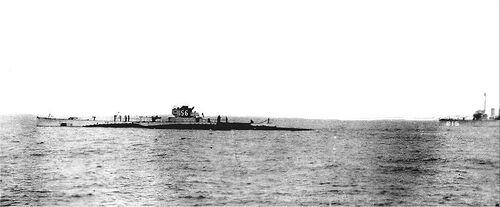
O-5 (SS-66), Collision with a merchant ship, October 28, 1923
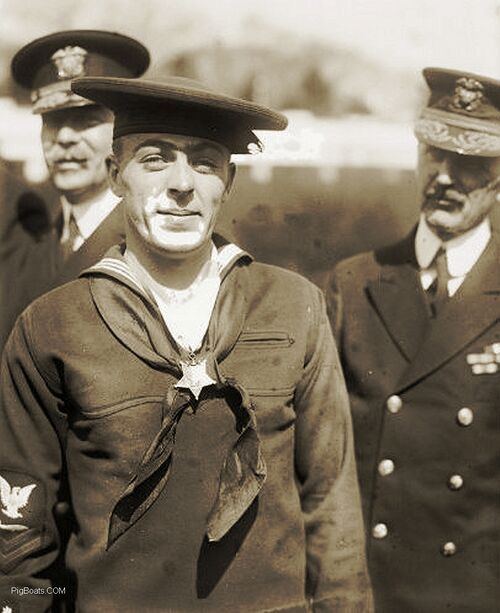
S-51 (SS-162), Collision with merchant ship, September 25, 1925
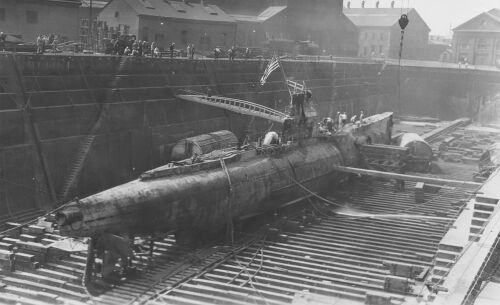
In addition, a granddaughter of one of the lost crewmen maintains an excellent informational site on the accident, which can be accessed at the enclosed link.
S-4 (SS-109), Collision with USCGC Paulding, December 17, 1927
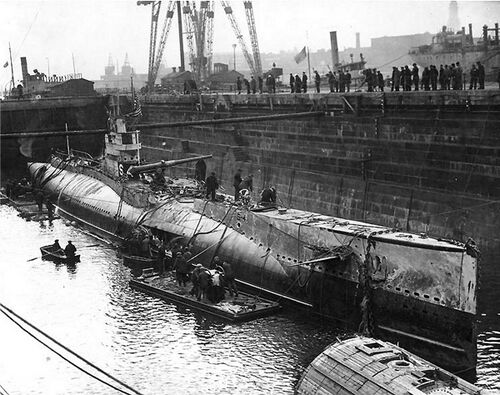
Squalus (SS-192), Equipment failure during a test dive, May 23, 1939
What followed was an epic story of the courage and tenacity of our sea service. In the first, and only, operational use of the McCann Rescue Chamber in the USN, all 33 men in the forward compartments were rescued and brought to the surface. Over the next three and a half months the Squalus was salvaged under very difficult conditions and returned to Portsmouth for repair and refurbishment. She was renamed Sailfish (SS-192) and returned to full service. She went on to have a fine war record.
PigBoats.COM has compiled a collection of rescue and salvage photos of this incident and they can be found at this link.
Page created by:
Ric Hedman & David Johnston
1999 - 2023 - PigBoats.COM©
Mountlake Terrace, WA, Norfolk, VA
webmaster at pigboats dot com
